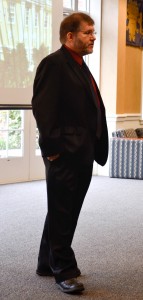
By Liz Wimberg
Correspondent
Benjamin Rifkin, dean of the School of Humanities and Social Sciences, shared stories of life in a police state from 1981 to 1985 during a presentation on Thursday, Oct. 13 in the Business Building lounge. After traveling through Moscow in a study abroad program, Rifkin was followed, detained and questioned by the Soviet secret police on more than one occasion.
Although the presentation was intended to be both informative and humorous, Rifkin made clear that he was not in any way undermining the many deaths in Soviet Russia at this time, nor the severity of the situations of which he spoke. With that said, he began with the episode of his first interaction in the country.
Rifkin is well-trained in the Russian language, but he misunderstood a question from an official in the airport. “Do you have drugs?” was interpreted as, “Do you have medicine?” to which his answer was a shocking “Yes.” After frantically searching his bags and finding nothing but Pepto Bismol and Aspirin, the official called Rifkin an idiot and continued his work.
Following this warm welcome, Rifkin learned to lead two separate lives — life in the dorm and life in public.
“The twain shall never meet,” said Rifkin, who was determined to spend his time in Moscow living as a native.
In his public identity, Rifkin wandered around the city in Russian attire and without his camera, so as to blend in with the locals. He called this “traveling incognito” and discovered that he wasn’t the only American practicing camouflage. He ran into a friend doing the same, and after talking, they decided to get lunch in a restaurant strictly for foreigners.
In what could be seen as something of a compliment to Rifkin, he and his friend were mistaken by the Komitet Gosudarstvennoy Besopasnosti (KGB) for Russian citizens attempting to dine in a forbidden establishment. The Russian KGB was an umbrella organization of the USSR until 1991, translating in English to “State Security Committee.”
They were detained and questioned separately. Rifkin took advantage of this opportunity and enabled the police to think he was Russian — not necessarily deceiving, but lying by omission. Eventually, the police realized they had made a mistake, and they apologized to him for any inconvenience they caused. Rifkin noted this was the first and only time he was ever apologized to by the KGB.
Rifkin’s presentation was full of similar stories of unpleasant interactions with the organization.
Finally, in May 1985, he was contacted by an employee of the KGB demanding the names of his Russian friends. Rifkin was able to avoid endangering his friends for a short period of time and was instructed to return to the office with names the following day.
Instead, Rifkin called home and used a particular code phrase that signaled an emergency. His family sent a telegram urging him to come home immediately, as his grandmother was very ill and dying. Rifkin was allowed to travel back to America temporarily, but he never contacted the KGB official. As a result, Rifkin was named an American spy and was forbidden to return to the country upon request in 1987.
By 1989, however, Rifkin found a way to return to Russia, and he was in the country at the time of the destruction of the Berlin Wall.
Several years later, he was contacted in the U.S. by the Russian university at which he studied in ’81. They asked him to take an all-expenses-paid trip back to the university to give a presentation. Rifkin was nearly in disbelief. Recalling his many run-ins with the KGB and the few particularly dangerous encounters, Rifkin was finally assured that peril was overcome, and a new era had begun.






